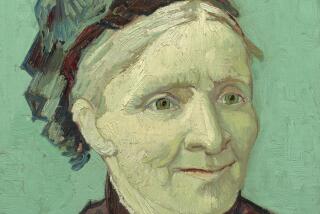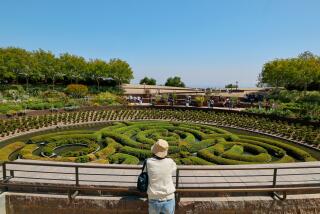The Holiday Gift for Those High-Rollers : THE SISTINE CHAPEL By Frederick Hartt and Gianluigi Colalucci (Alfred A. Knopf: $1,000; 2-volume set)
Art books typically tend to be pricey, but some kind of record surely has been shattered by a price tag of $1,000--especially for a book about a single painting.
The painting in question happens to be rather large--some 13,000 square feet--and the book that scans its every nuance is a two-volume set, oversized and slip-cased, linen-bound and Swiss-printed, individually numbered in a limited edition of 2,500, and stuffed with 600 very good color photographs, many of them gate-folds (three unfurl to four feet in length).
Still, it’s hard to figure out precisely for whom this lavish extravaganza has been produced. A chronicle of the Vatican’s Sistine Chapel ceiling, painted by Michelangelo between 1508 and 1512, the set seems chiefly a prestige item for Japan’s Nippon Television Network Corp. Nippon underwrote much of the widely publicized conservation of the dazzlingly colorful ceiling, which had been obscured for centuries beneath soot and grime, in exchange for exclusive rights to market video and photographs of the project.
The next, by the late Renaissance scholar Frederick Hartt and the notes, by Fabrizio Mancinelli and Gianluigi Colalucci, curator and conservator, respectively, of the Vatican Museums, are quite useful. But the book is ultimately about the often mesmerizing pictures. Seeing the vividly painted frescoes in such detail--down to charcoal dots left by “pouncing,” a process of transfering preparatory drawings to wet plaster--is disorienting.
For the first time, you begin to approximate the point of view that Michaelangelo had up on the scaffolding when painting the fresco. (Despite Charlton Heston’s cinematic fabrication, the artist did not lie on his back to work.) Much has been made of the way the cleaning has revealed to us a different Michelangelo, one who extended a Floretine tradition of bright color in the Sistine frescoes and became an immediate bridge to the Mannerist epoch. Yet these pictures suggest something else--namely, why an extraordinary sculptor, who painted only reluctantly, was able to create this astonishing two-dimensional achievement.
Putting your eye in proximity to the artist’s suddenly makes you aware of the sharp differences between how the painting looks up close, from atop the scaffolding, and how it was meant to look from the floor of the chapel far below. As he worked, Michelangelo had no way to check this floor-bound view.
As a sculptor, though, his primary tools were volume and space. When one stands in the chapel, the volume of the room and the space between ceiling and floor together become dynamic factors in the perception of the painting’s form.
The principle weakness of the book is itself a design flaw. Heavy, even unwieldy, it suffers from the placement of the text’s often informative footnote at the end, rather than at the bottom of each page. This book can’t exactly be casually flipped back and forth.
Most problematic, though, it requires you to make a daunting choice. After all, for $1,000 you could buy this sumptuously revealing photo-essay--or else you could fly to Rome for the weekend, and actually indulge in looking at a magisterial work of art.
Decisions, decisions.
More to Read
The biggest entertainment stories
Get our big stories about Hollywood, film, television, music, arts, culture and more right in your inbox as soon as they publish.
You may occasionally receive promotional content from the Los Angeles Times.










